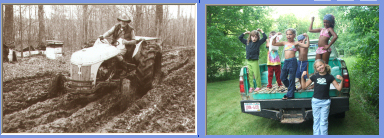Forestry; Managing our Woodlands and Woodworking with its Products
Last Updated: Ovtober 20, 2023

French Creek Valley Home Sawn Lumber, 2009 and Later Our Maple Syrup Story
Black Walnuts Steam Bending Wood Contact Us
Woodworking Youtube Videos
Reviving 36" B.M. Root BandsawA "Thumb Drive Tree" From a Piece of 2X4
How I Make Portable Wooden Sidewalks
A One-Man Manual Log Carrier
Upgrading the Log Carrier with a Tractor Hitch
Assessing Logs Along the Powerline Easement
We have about 45 acres of woods on our place, scattered in 3 locations. Soil types are the "Heavy " variety and the topography varies from hilltop (drier), to "halfway up the hill" (sometimes marshy) to "floor of the valley" (usually sandier). The main more-or-less mature species of trees are White Oak, Basswood, Sugar Maple, Black Ash, Poplar, Red Oak, American Elm (that survived the Dutch Elm blight of the 60's and 70's), Black Walnut, Smooth Bark Hickory, Cherry, White Ash, Butternut, White Pine, Colorado Blue Spruce, Norway Pine and Yellow Birch, in order of frequency. Between 1977 and 1992 we heated our old house with wood and never even kept up with the deadfalls from this prolific energy source. From 1974 until about 1985 we planted some 7000 additional trees, introducing several species of conifers, Black walnut and other deciduous types.
Although our main use for wood was for heat, we did harvest several thousand board feet of Elm back in the mid 70's. We sawed it into 1" boards, 2X4's and 2X6's. We used the wood for many projects around the farm and are only now running low on this tough material. Over the years, as we made our firewood, we would section out promising saw logs and take a half dozen at a time to one of the 4 or 5 local saw mills for conversion to dimension lumber for possible future projects. We have several thousand board feet stored inside, in a building dedicated to that use; some of it for well over 40 years, now. Although we saw most of our logs to 8'6", Some billets are 16' long and some boards are as wide as 20" or so.
About 80% of our sawn lumber is in 1 inch and 2" thick boards, and the rest is in 4 inch and 6 inch thick material.
We continue this cut-saw-sticker practice to this day, although we don't currently heat with wood.

Start the Pond Air Dried Lumber "Sugar Wood" Cherry for Bowls
We started making Maple Syrup in 1995, utilizing the main concentration of Sugar Maples, conveniently located UP the hill so the whole thing worked by gravity. That is another story. We had been burning wood scraps from a local business to fuel the evaporator, but soon we started cutting our own firewood for that purpose.
Woodland management consists of keeping fences up enough to keep cattle out, looking for and treating any signs of disease, planting to fill in thin spots, cleaning out deadfalls that might endanger other trees, discouraging beavers who like to cut down everything that is young and to drown everything that is mature, avoiding the creation of tractor tracks that might start erosion, etc..
We use our forest for recreation, too. There are 3 creeks on the place and there's a small pond that we dug in 1975 (see humble start, above)with help from the US Soil Conservation Service.
One the one hand, we get water in places that we don'tneed it, on the other, the pond in the woods is a great place for picnics and for showing off.
